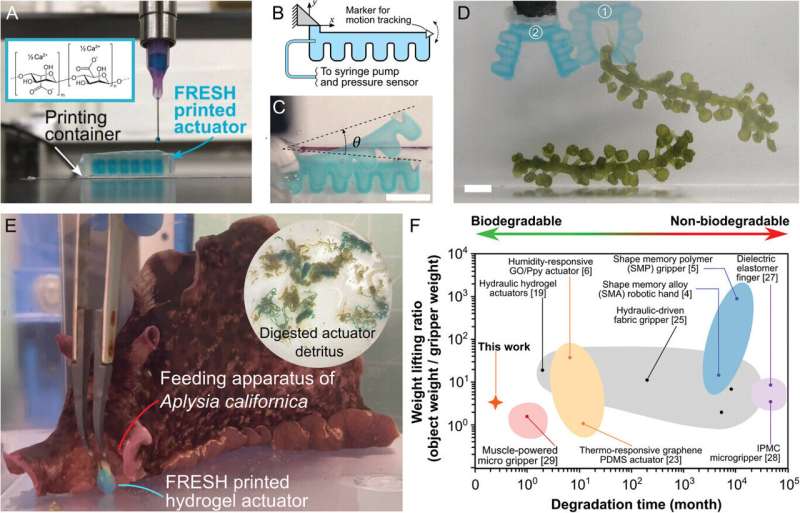This article has been reviewed according to Science X's editorial process and policies. Editors have highlighted the following attributes while ensuring the content's credibility:
fact-checked
peer-reviewed publication
trusted source
proofread
Team prints seaweed-based, biodegradable actuators

Traditionally, soft robots have been made using synthetic polymers, rubbers, and plastics. Such materials provide soft robots with long operational lives and stable structures, but may pose risks to the environment if lost or damaged during use. Researchers seek to minimize this risk by creating new ways to build naturally decomposable robots.
An interdisciplinary team at Carnegie Mellon University, led by Victoria Webster-Wood and Adam Feinberg in collaboration with Carmel Majidi and Lining Yao, is developing new ways to fabricate biodegradable actuators for marine applications. Using a bio-ink made of materials sourced from common brown seaweeds, the research team identified designs and printing parameters that allow water-tight structure to be printed using the FRESH Printing method.
"We are very excited to expand the fabrication capability of the FRESH Printing method and optimize it for soft robotic applications," explained Wenhuan Sun, MechE Ph.D. student. "The unique benefits of FRESH make it possible to create robotic structures with a combination of unusual properties."
Their approach, recently published in Advanced Functional Materials, allows small scale, very soft actuators that can extend, bend, and twist to be fabricated. They can also be combined into structures for gripping and positioning. The seaweed-based inks used by the research team rely on calcium to crosslink and form gels. This allowed the researchers to leverage the material properties in order to create actuators that can change shape and stiffness by varying the degree of crosslinking in the actuators.
"How do we balance the need for advanced soft robotic structures with the potential environmental impact that results from their creation? We believe that the biodegradable actuators printed using FRESH are a promising solution, and we are excited to continue making improvements," said Ravesh Sukhnandan, MechE Ph.D. student.
The actuators' capabilities don't stop there. In addition to their robotic functionality, the actuators are fully biodegradable, degrading in natural ocean conditions within seven days. The actuators can also be safely consumed by marine organisms. This means that if lost or damaged during use, the actuators pose minimal risk to the environment.
Moving forward, the team hopes to further understand actuator performance in natural environments and extend this printing approach to complete robotic structures.
More information: Wenhuan Sun et al, Biodegradable, Sustainable Hydrogel Actuators with Shape and Stiffness Morphing Capabilities via Embedded 3D Printing, Advanced Functional Materials (2023). DOI: 10.1002/adfm.202303659

















